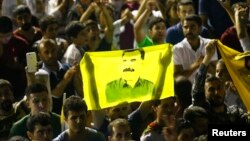An umbrella network of Kurdish organizations that includes the outlawed Kurdistan Workers’ Party (PKK) has announced a three-year-long cease-fire agreement with Ankara is now over, dealing a major blow to a protracted reconciliation process with Turkey's Kurds.
The PKK-linked Kurdish Communities Union (KCK) declared an “end to the cease-fire” first agreed in 2012 and warned it would target "all the dams” in the country’s southeast.
In the statement delivering a significant setback to the fragile off-and-on peace process, the KCK said Turkey's building of barracks, dams, and roads for military purposes had violated the truce.
"The Turkish State took advantage of the cease-fire conditions, not for a democratic political resolution, but to gain an advantageous position in preparation of war by building dozens of guard posts, roads for military purposes and dams in order for a cultural genocide," the statement said.
Unusual release
The statement was first released to the Firat, a PKK-linked news agency based in Amsterdam.
The PKK launched a three-decade-long self-rule insurgency in 1984. It tempered its aims subsequently and its imprisoned leader Abdullah Öcalan has been negotiating a resolution to the conflict. But in recent months the process has stalled with positions hardening on both sides.
Some senior PKK officials have been expressing deep reservations about the process; and some fighters told VOA recently that they no longer believe in Öcalan’s peace strategy.
“If he were released tomorrow, we would celebrate his freedom. But I can assure some fighters would try to assassinate him the following day,” one veteran fighter told VOA in the spring. He asked for his name not to disclosed in any reporting of his views.
Positions have also been hardening on the government side. In March, the country’s president, Recep Tayyip Erdogan, dismissed the idea there is even a Kurdish problem, prompting fears that talk of a breakthrough by his ministers was misplaced.
Erdogan argued Kurds already enjoy equal rights with the rest of the country and should not need anything else.
“The only thing in their eyes is the Kurdish question. What are you talking about? There is no such thing, there is no Kurdish question,” he thundered in a speech.
He added, “What Kurdish problem? ... What have you not got? ... What else do you want? For God's sake, what don't you have that we do, you have everything,” he said.
KCK's invovlement
Opposition politicians tied his nationalist dismissal of the Kurds to the June parliamentary elections. His ruling Justice and Development Party (AKP) lost its majority in the polls and is now immersed in coalition talks, with the most likely partner being the right-wing Nationalist Movement Party (MHP), which wants to see an end to the peace process.
Whether the PKK leadership will formally endorse the Union’s announcement of an end to the cease-fire remains unclear. It is also unclear why the PKK did not issue a formal statement itself.
One Turkish intelligence official told VOA that Öcalan had not signed off on the threat and so hardliners had to “use the KCK as a vehicle.”
The sentiments of frustration and deep anger contained in the weekend statement reflect the ire of many of the country’s 12 million Kurds towards Ankara.
“The Kurdish movement has decided to not to accept this treatment any more,” said the PKK-dominated KCK.
Kurdish anger has been boiling since the Turkish government refused to intervene militarily to help the Syrian Kurdish defenders of the border town of Kobani to see off a months-long siege by Islamic extremists.
During the siege, which was lifted in January partly as a result of fierce U.S.-led coalition airstrikes on the extremists, Turkish jets launched air raids on PKK positions in southeast Turkey.
The main Syrian Kurdish group is an offshoot of the PKK. Further anger was prompted last month when the Turkish President warned he would not allow the Syrian Kurds to create a state of their own along the border with Turkey.
And clashes between the PKK and the Turkish military have increased in the southeast of the country, with both sides accusing the other of prompting the fights.
"Our people have stood as human shields in the face of such moves that would start this war and many of our people, including the youth, lost their lives in the attacks by the state” the KCK said in the weekend statement.
Trading accusations
Since 1984, nearly 40,000 people have been killed in clashes with the PKK, which is designated as a "terrorist organization" by the international community, including the United States and the European Union.
Monday, pro-Kurdish lawmaker Altan Tan accused the government of paving the way for a collapse of the peace process by acting slowly and dragging its feet in the talks. Those who want a [peace] resolution have to act swiftly to avert a rekindling of the insurgency, he says.
On Sunday, a minibus carrying civilians came under fire when a group of Turkish gendarmes in Göle, a district in Ardahan province, clashed with PKK militants, leaving one person dead and two injured.
Turkey's Prime Minister Ahmet Davutoglu vowed Monday the construction of dams and roads in the country's mainly Kurdish southeast would continue.
"Governments build roads and dams," he said. "They don't back down through threats.”
He accused the PKK of reneging on a pledge to withdraw armed fighters from Turkish territory.




